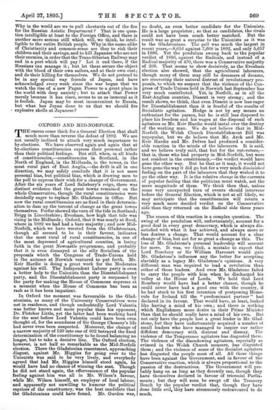TOPICS OF THE DAY.
RUSSIA AND JAPAN. THE secret of the disturbance caused by the rise of Japanese power, is clearly its effect upon Russia, which must be very great. Neither Germany nor France nor Great Britain are, as yet, affected by it, though the latter might be in certain contingencies ; but Russian interests are directly and seriously imperilled. It is Russia, therefore, which is threatening Japan, Russia which is increasing her garrison in the Far East, and Russia which is instigating both Germany and France to aid her in an "armed remonstrance" against the Treaty of Simonoseki. As this temper in St. Petersburg may produce grave results either immediately or after 1900, when the Trans-Siberian Railway is to be completed, it is worth while to examine quietly whether it has any justification in the facts. We English do not intend to be unjust, but we have a trick of not seeing our neighbours' motives, which has all the effect of injustice, though our blindness is due, not as the Continent fancies, to deliberate selfishness, but to a lack of imagination.
It is a very hard thing for a mighty nation like the Russian, with its hundred millions of white people under one flag, and its position upon two continents, not to possess a single port accessible at all seasons of the year. Archangel and Riga are locked by frost through half the year ; Astrachan stands upon an inland sea ; and Odessa, though it touches the great mass of unbroken water, and can be always entered, can be shut at the will of a Power which the Russian people regard as their secular enemy. This inconvenience, which would drive Englishmen almost crazy, is, however, most felt in their Asiatic dominion, where an Empire full of the grandest potentialities has only one wretched outlet to the world, Vladivostock, and that locked up by ice for half its time. The Russians, pressed by an increasing population, and by the gradual sterilisation of some of their provinces, a sterilisation akin in kind to that of parts of New England, have decided to utilise and populate their Asiatic posses- sions, which contain millions on millions of culturable acres, and for that purpose, among others, are driving an arterial railway right across the Asiatic continent. To make this railway pay, and bring to the new settlers an open communication with Eastern and Southern Asia, that is, with the most profitable trade in the world, the line must end in an open port; and the Russians possess only Vladivostock, which is no more open than Riga. They desire, therefore, as we should desire under the same circumstances, a more southerly harbour, and fully believed that they should get one in Port Lazareff, the best harbour on the east of Corea. With a slice of Manchuria, purchased from China by certain concessions, and a slice of Corea torn from the powerless rulers of that wretched Kingdom, they would be able to deflect their railway-line to the south, and use as its terminus a grand port, which, lying opposite Japan, in water always free from ice, with easy access to China and Australia, might grow into a Liverpool, and gradually enrich Asiatic Russia with a stream of pro- fitable commerce. This undoubtedly, in fact admittedly, was the Russian dream, and we cannot but see that the disappointment caused by the rise of Japan is natural and excusable. For it is a terrible disappointment. The Mikado's Government, even if it does not actually wish for a struggle with Russia, about which we have some doubt, the acknowledged Japanese feeling being that until they have faced a European Power they have done nothing, will certainly be indisposed to allow Russia to take the needful slice of Corea, or to enter, as has also been pro- posed, the Gulf of Pechili. The very objects for which they have made war,—namely,quiet ascendency in Corea and pre- dominant influence in China, would be frustrated, and their magnificent position on the Liau-tung Peninsula would be a source of anxiety rather than of strength. They must keep Russia out, whatever the risk ; and if their Fleet is strong enough, they can do it, for neither Port Lazareff, nor any other harbour, will suit Russia if it is liable to blockade. The Russians perceive the change in their 'position almost by instinct, and the irritation among her governing men, especially those who control the Asiatic Department, must be excessive. It is under this irritation that the Russian Press has been set free to threaten Japan, which it does in a curiously unintelligent way, one writer apparently believing that Wei-hai-wei is in Southern China, that a hint has been given to the " Volunteers " in the Black Sea to provide two cruisers for Vladivostock, and that the garrison there has been increased, some say by twenty thousand men. It is under this irritation also that Russians are talking of a European Conference to revise the treaty of Simonoseki. Whether this means war it is difficult to determine, for the cooler heads in Russia will counsel delay till the railway has reached the Lower Amour ; but it certainly means hostility. The Russians, in fact, are very angry indeed ; and the German Emperor, perceiving that, has rather adroitly offered aid, which will cost him little ; while France, as usual, is most sympathetic, and but for Madagascar and the Budget, might order a powerful squadron into Chinese waters. The Russian Government, however, perceives that these sympathetic overtures do not come to much, that the only real naval power in the East, except her own and the Japanese, is the British ; and that she must either procure British assistance, or do the whole work for herself by land, for which she is not ready. She can, of course, if she likes, invade Corea, and try to drive the Japanese out ; but she would be beaten, and it is childish to talk, as one newspaper does, of invading Yesso, until the Japanese Fleet has been destroyed, and so long as Britain looks on in watchful calm, the Japanese Fleet is indestructible.
We sincerely hope that the cue which has apparently been given to the daily papers is an accurate one, and that her Majesty's Government has decided to stand aside while the Continental Goinrnments offer remonstrances at Tokio. We could not afford to be shut out of the new trade with China ; but there is no attempt in the Treaty of Simonoseki to secure preferential terms, and the remaining conditions of peace do us no sort of injury. They are the usual conditions imposed by civilised victors on civilised vanquished, and unless they menace our future, they afford no fair ground even for discussion. As to submitting them to a European Conference, no treaty with China has ever been so submitted ; nor, indeed, has any treaty with any Asiatic Power except Turkey. We doubt, indeed, if such a Conference were called, whether Japan would consent to attend, her first and most obvious object being to declare herself one of the Great Powers, or at least, entirely outside that posi- tion of semi-dependence in which many treaties and the continuous defeats of the century have placed the Ottoman Empire. Of course, the Continental Powers may remonstrate at Tokio if they please, but their remonstrances. unless backed by an armed demonstration, will produce but little effect, and an armed demonstration without British consent is admitted to be impossible. • The casting voice for once remains, in fact, with Great Britain, and we are happy to believe that she will use it in favour of moderation and peace. We do not know what the Japanese victory will produce, except the development of a new Power, and can very well wait till we do. Russia, we admit frankly, is threatened by the result of the war, is even, at least in her own judgment, directly and seriously injured ; but it is not our business to fight for Russia. If we must have an alliance we should do far better to accept Sir Henry Howorth's suggestion, and arrange with the United States for a common policy in the North Pacific. The journalists of St. Petersburg seem to forget history a little too easily. For twenty years past they have been threatening us in India; they have compelled us to increase our army there, and to hamper the Treasury with new expenses ; and only two years ago they confessed that they advocated the Trans-Siberian Railway as an instrument which might enable them to drive the British out of Asia. And now, because, without any action of ours, Fate or Providence appears disposed to thwart one of their designs—a natural design, we have ad- mitted, and not an unwise one, from their point of view —they are beseeching us to aid them in doubling the value of the Siberian Railway, and accuse us of " selfishness " and "perfidy" because we hesitate or refuse. In private life such conduct would be pronounced impudent, and even in the transactions of States, which are necessarily guided by self-interest, it is marked by a certain contempt for the understanding of those from whom the favours are asked. Why in the world are we to pull chestnuts out of the fire for the Russian Asiatic Department ? That is one ques- tion intelligible at least to the Foreign Office, and there is another more serious still which will, we think, be intel- ligible to the entire British people. Why in the name alike of Christianity and common-sense are they to risk their children and their savings, and to kill Japanese who are not their enemies, in order that the Trans-Siberian Railway may end in a port which will pay ? Let it end there, if the Russians can manage it ; but let them secure the object with the blood of their own sailors, and at their own cost; and do their killing for themselves. We do not pretend to be in any special way friends of Japan, and have acknowledged every week since the war began that we watch the rise of a new Pagan Power to a great place in the world with deep anxiety ; but to attack that Power merely because it has risen, seems to us as immoral as it is foolish. Japan may be most inconvenient to Russia, but what has Japan done to us that we should fire • explosive shells at Japanese ?



















































 Previous page
Previous page